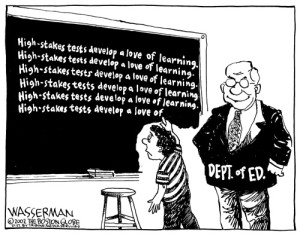[fusion_builder_container hundred_percent=”yes” overflow=”visible”][fusion_builder_row][fusion_builder_column type=”1_1″ background_position=”left top” background_color=”” border_size=”” border_color=”” border_style=”solid” spacing=”yes” background_image=”” background_repeat=”no-repeat” padding=”” margin_top=”0px” margin_bottom=”0px” class=”” id=”” animation_type=”” animation_speed=”0.3″ animation_direction=”left” hide_on_mobile=”no” center_content=”no” min_height=”none”]
I was a conscientious high school student eager to impress my father with my academic prowess. When I shared with him the results from my performance on an algebra exam on which I earned a score of 98%, he jokingly asked “what happened to the other two points?” I appreciated his humor; however, his remarks did spur me to strive for those elusive two points.
Today there is much inane chatter about how to add points to students’ test scores. This cycle of blame reminds me of the classic children’s tale, The Little Red Hen. Who will help improve educational results documented as students’ test scores? Unfortunately, clueless politicians and educational bureaucrats think they can do it by throwing more money (our money) at the problem and more regulations and restrictions at teachers.
These oppressive restrictions and regulations are characteristic of an organization structured as a machine bureaucracy (Skrtic, 1995). In this assembly line work model, politicians and educational administrators do all the thinking and teachers simply follow their rules. Unthinking, inflexible management treats teaching as simple work that can be rationalized and formalized. This skewed logic minimizes professional discretion and separates theory from practice. Schools were never intended to function as machine bureaucracies.
Teachers are professionals. As such, our work should be client-centered (student-centered). However, teachers are not given the discretion to adjust their teaching to meet students’ needs. In today’s educational environment, students’ needs are trumped by the need of bureaucrats for regulation and standardization. What have THEY done to our profession? The following is a simplified version of how I see the current situation.
It is presumed by educational bureaucrats that students must learn the material required to pass grade-level tests (Prepared by whom? Based on what?). Therefore, the tail is wagging the dog. The test is dictating a standard set of teaching practices based on students’ perceived learning needs. What happens if their needs fall outside the parameters of their grade-level curricular? Is it possible that some students’ academic successes might depend on teaching practices not included in the limited repertoire that teachers are mandated to follow?
What if doctors faced the same professional malaise from which teachers currently suffer? You take your five-year-old to his pediatrician for an earache. Much to your chagrin, the pediatrician apologizes as he reports that he may not treat children for earaches once they pass the age of four. It is, however, presumed that all five-year-olds will need medical treatments to eliminate strep throats, which your pediatrician will gladly provide. Like the relation between doctors and their patients, our work should be based on the needs (not perceived needs) of our students.
Once we are no longer forced to teach on a chain gang, then, and only then, will teachers be able to support their students’ academic achievements, allowing them to earn the elusive extra points. In his book Disability and Democracy, Skrtic (1995) contends that “complex work cannot be formalized through rules and regulations, except in misguided ways which program the wrong behaviors and measure wrong outputs, forcing professionals to play the machine bureaucratic game – satisfying the standards instead of serving the clients” (p. 201).
[/fusion_builder_column][/fusion_builder_row][/fusion_builder_container]


